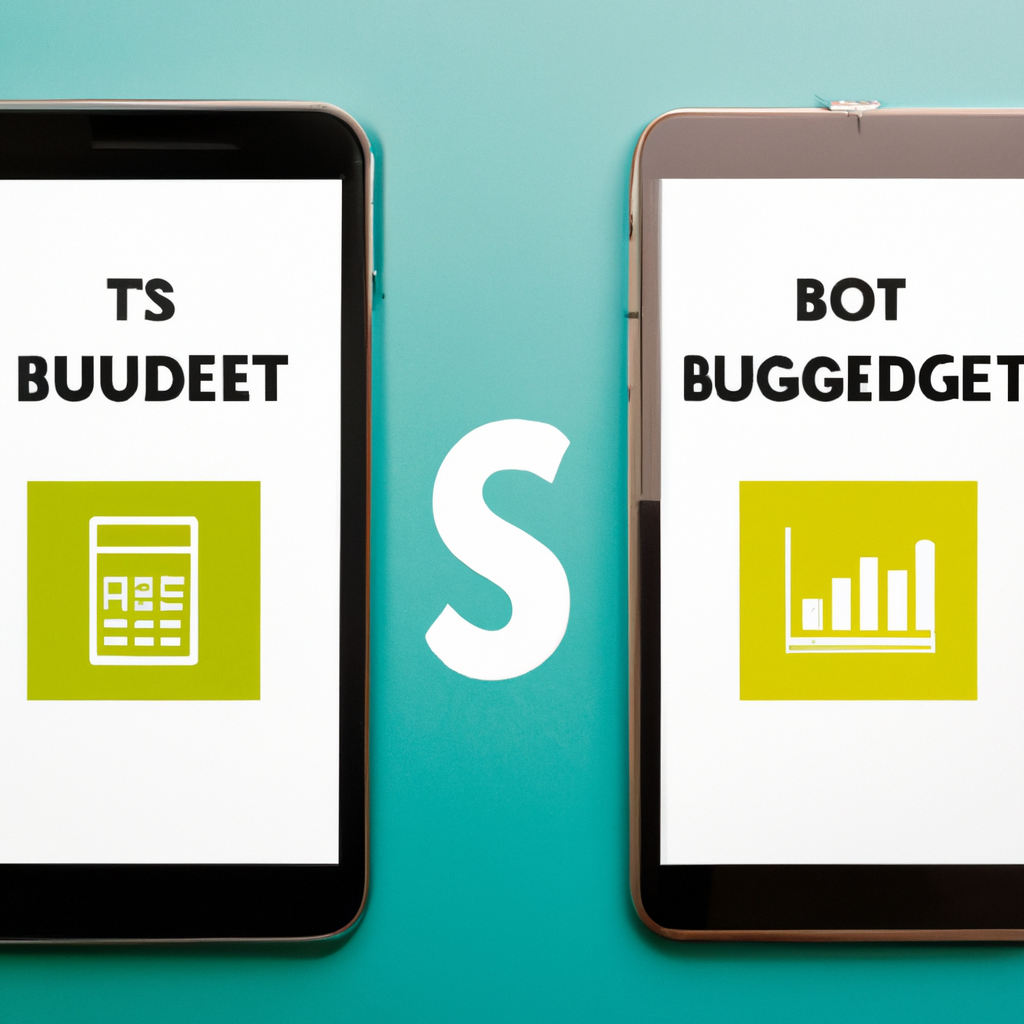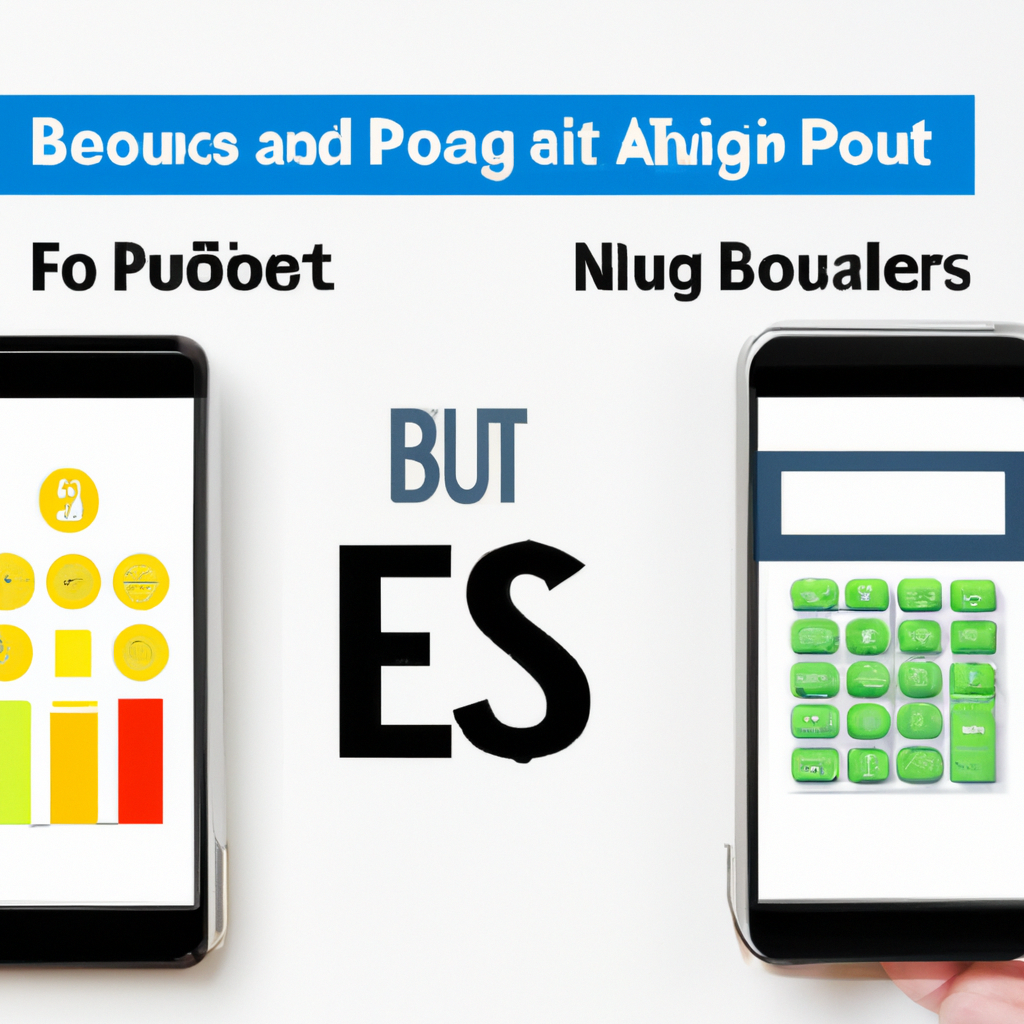Do you find it challenging to keep track of your expenses and manage your finances effectively? If so, you may be wondering whether you should utilize budgeting software or apps to simplify the process. This article explores the advantages and differences between budgeting software and apps, allowing you to make an informed decision about which option suits you best. Whether you’re striving to save more, reduce debt, or achieve financial goals, understanding the benefits of budgeting software and apps can empower you to take control of your financial well-being.

What is budgeting software?
Budgeting software is a type of computer program that helps individuals and businesses manage their finances by creating and tracking budgets. It provides a digital platform to analyze income, expenses, and savings, making it easier to understand and control your financial situation. With budgeting software, you can set financial goals, categorize expenses, and monitor your progress towards meeting those goals.
Definition and Features
Budgeting software typically offers a wide range of features that aid in financial management. Some common features include:
-
Budget Creation: The software allows you to create personalized budgets based on your income and expenses. You can assign fixed amounts for various categories and track your spending against the allocated budget.
-
Expense Tracking: Budgeting software allows you to track your expenses automatically by linking to your bank accounts and credit cards. This helps you stay organized and aware of where your money is going.
-
Financial Goal Setting: You can set financial goals such as savings targets, debt repayment, or a specific purchase. The software helps you stay focused by tracking your progress and notifying you when you’re off track.
-
Reporting and Analysis: Most budgeting software provides comprehensive reports and graphical representations of your financial information. This enables you to gain insights into your spending patterns, identify areas for improvement, and make informed financial decisions.
-
Bill Reminders: Budgeting software often includes bill reminder features, sending you alerts before the due dates of your recurring payments. This ensures you don’t miss any deadlines and incur late fees.
Pros and Cons
Pros:
- Streamlines the budgeting process: Budgeting software automates calculations and simplifies the task of managing finances, saving you time and effort.
- Provides detailed insights: The software offers robust reporting and analysis tools, allowing you to have a deeper understanding of your financial health.
- Facilitates financial goal achievement: With budgeting software, it’s easier to track progress and stay motivated towards achieving your financial goals.
Cons:
- Learning curve: Some budgeting software may have a learning curve, especially for those who are not familiar with technology or financial management concepts.
- Cost: While there are free budgeting software options available, some advanced features may require a paid subscription.
- Potential security risks: As budgeting software may require connecting to your bank accounts and credit cards, there is a potential risk of data breaches or hacking. It’s important to choose reputable and secure software.
What are budgeting apps?
Budgeting apps are mobile applications that provide a convenient way to manage your finances on the go. These apps can be installed on smartphones or tablets, allowing you to easily access your budgeting tools wherever you are. Budgeting apps offer many of the same features as budgeting software but in a more portable and user-friendly format.
Definition and Features
Budgeting apps are designed to offer similar functionalities as budgeting software, but with the convenience and accessibility of being on your mobile device. Some key features of budgeting apps include:
-
Expense Tracking: Like budgeting software, apps enable you to track your expenses by linking to your bank accounts and credit cards. This enables real-time monitoring of your finances.
-
Goal Setting: You can set financial goals within the app and track your progress towards achieving them. The app may provide notifications and reminders to keep you motivated.
-
Automated Categorization: Budgeting apps often categorize your expenses automatically, making it easier to analyze your spending habits and identify areas for improvement.
-
Simplicity and Ease of Use: Budgeting apps are typically designed with a user-friendly interface, making it easy for anyone to navigate and utilize the tools effectively.
-
Syncing Across Devices: Many budgeting apps allow synchronization across multiple devices, enabling you to access your finances from different platforms and share information with other users, such as a partner or family member.
Pros and Cons
Pros:
- Convenient and portable: Budgeting apps can be accessed on your mobile device, meaning you can manage your finances anytime and anywhere, making it easy to stay on top of your budget on the go.
- User-friendly interface: Budgeting apps are designed to be intuitive and straightforward, making them accessible even for those who may not be tech-savvy.
- Real-time tracking: With budgeting apps, you can track your expenses and review your budget in real-time, allowing for immediate adjustments and better financial decision-making.
Cons:
- Limited screen size: The smaller screen on mobile devices can sometimes limit the level of detail and functionality available compared to budgeting software on a computer.
- Reliance on internet connectivity: Budgeting apps typically require an internet connection to sync and update your financial information. This may pose challenges if you are in an area with poor or no internet coverage.
- Potential compatibility issues: Some budgeting apps may not be compatible with all mobile operating systems, limiting the options available to certain users.
Differences between budgeting software and apps
While both budgeting software and apps serve the same purpose of helping you manage your finances, there are some significant differences between the two options.
Cost
Budgeting software often comes with a price tag, especially for more advanced versions or those targeted towards businesses. Some software may require a one-time purchase, while others have a subscription model. On the other hand, budgeting apps usually offer a free basic version with limited features, as well as a premium version that requires a subscription. The cost of apps is generally more affordable compared to budgeting software.
Functionality
Budgeting software generally offers more advanced features and customization options compared to apps. Software can often handle more complex financial tasks, making it a better choice for businesses or individuals with more intricate financial situations. Apps, on the other hand, are designed to be simpler and more user-friendly, focusing on the essential features necessary for personal budgeting.
Accessibility
While both software and apps can be accessed on computers or mobile devices, budgeting apps offer greater convenience and accessibility due to their mobile nature. With a budgeting app, you can manage your finances wherever you are, as long as you have your mobile device with you. Software, however, requires access to a computer or laptop, limiting its portability.
Benefits of using budgeting software:
Budgeting software offers several benefits that cater to individuals or businesses with more complex financial needs.
Advanced Features
Budgeting software often includes advanced features for financial analysis, forecasting, and planning. These features allow you to create detailed reports and explore your financial data from various angles, aiding in strategic decision-making and long-term financial planning.
Customization
Budgeting software allows for greater customization options. You can tailor the program to fit your specific financial goals and needs, creating personalized budgets and tracking methods. This flexibility is particularly useful for businesses with multiple departments or individuals with unique financial situations.
Comprehensive Reporting
Budgeting software typically provides comprehensive reports and visual representations of your financial data. These reports offer a holistic view of your finances, allowing you to identify trends, spot areas of improvement, and make more informed financial decisions. Detailed reports are invaluable for businesses and individuals who require in-depth analysis of their financial standing.

Benefits of using budgeting apps:
Budgeting apps offer unique advantages that make them an attractive option for personal finance management.
User-friendly Interface
Budgeting apps are designed with simplicity in mind, making them highly user-friendly. The interface is intuitive, allowing even those without extensive financial knowledge to easily navigate and utilize the app’s features. This user-friendliness is beneficial for individuals who want a straightforward and hassle-free budgeting experience.
Synchronization
Budgeting apps often provide synchronization across multiple devices, ensuring that your financial information is up to date and accessible from any platform. This allows you to seamlessly switch between devices and collaborate with others, such as partners or family members, in managing your shared finances.
Mobile Access
One of the major advantages of budgeting apps over software is their mobile accessibility. With a budgeting app on your smartphone or tablet, you can manage your finances on the go. This flexibility is particularly useful for individuals with busy lifestyles or those who travel frequently, as it allows for real-time expense tracking and budget adjustments anywhere, anytime.
Considerations when choosing between software and apps:
When deciding between budgeting software and apps, several factors should be taken into consideration to ensure the most suitable choice for your financial needs.
Financial Goals and Needs
Consider your financial goals and the complexity of your finances. If you have straightforward personal finance needs and want a simple interface, a budgeting app may be the best choice. However, if you require advanced features, detailed reports, or need a solution for complex business finances, budgeting software is likely the better option.
Technical Skills
Assess your comfort level with technology and your ability to navigate complex software programs. If you are tech-savvy or have previous experience with financial software, you may find budgeting software easier to navigate and more beneficial. In contrast, if you prefer a more user-friendly and intuitive experience, a budgeting app may be more suited to your skill level.
Budgeting Style
Consider your preferred budgeting style. Some individuals prefer a hands-on approach, manually entering and categorizing their expenses, while others prefer automation and syncing with their financial accounts. Budgeting software typically offers more options for manual customization, while apps excel in automation and syncing capabilities.

Popular budgeting software options:
Several budgeting software options are available in the market, each with its own unique features and pricing structures. Here are three popular budgeting software options:
Quicken
Quicken is a widely recognized and established budgeting software that caters to both personal and business finance needs. It offers robust features such as expense tracking, investment management, bill pay, and tax management. Quicken is available in various editions, each with different features and pricing options to suit different user requirements.
YNAB (You Need a Budget)
YNAB is a budgeting software focused on helping individuals achieve their financial goals. It emphasizes a proactive budgeting approach, giving users the tools to allocate funds based on their priorities and make informed spending decisions. YNAB offers a user-friendly interface, real-time syncing across devices, and comprehensive reports.
Mint
Mint is a popular budgeting software that focuses on personal finance management. It offers a range of features, including expense tracking, bill reminders, goal setting, and credit score monitoring. Mint’s intuitive interface and free basic version make it a popular choice for individuals looking for a user-friendly budgeting solution.
Popular budgeting app options:
Budgeting apps have gained popularity due to their convenience and ease of use. Here are three popular budgeting app options:
PocketGuard
PocketGuard is a well-known budgeting app that helps individuals gain control of their finances. The app aggregates all your financial accounts and displays your current financial picture in real-time. PocketGuard automatically categorizes expenses, offers budgeting advice, and sends alerts when you approach or exceed budget limits.
Goodbudget
Goodbudget is an app that utilizes the envelope budgeting system. It allows you to allocate funds into virtual envelopes for different spending categories. The app tracks your spending and provides insights into each envelope’s balance. Goodbudget offers both free and premium versions, with the premium version providing additional features and envelope capacity.
Wally
Wally is a popular budgeting app known for its simplicity and streamlined user experience. The app allows you to track your expenses, set financial goals, and visualize your spending patterns through graphs and charts. Wally is free to use and offers a feature-rich experience without any subscription fees.

Factors to consider when selecting budgeting software or apps:
When choosing between budgeting software and apps, consider the following factors:
Price
Evaluate the cost of the software or app and determine whether it fits your budget. Consider not only the initial cost but also any potential subscription fees or add-on costs for advanced features. Compare the pricing options of different software or apps to find the most cost-effective solution for your needs.
Compatibility
Ensure that the software or app is compatible with your devices and operating systems. Check if it supports integration with your financial institutions and if it can import your existing financial data. Compatibility is crucial to ensure a smooth and seamless budgeting experience.
Security
Security should be a top priority when selecting budgeting software or apps. Research the security measures implemented by the software or app provider to protect your personal and financial information. Look for strong encryption, secure data transfer protocols, and good track records in handling sensitive data.
Conclusion
In conclusion, when deciding between budgeting software and apps, it’s essential to consider your financial goals, technical skills, and budgeting style. Budgeting software offers advanced features, customization options, and comprehensive reporting, making them ideal for businesses and individuals with complex financial needs. On the other hand, budgeting apps provide a user-friendly interface, synchronization across multiple devices, and mobile accessibility, making them convenient for personal finance management on the go.
Ultimately, the choice between budgeting software and apps depends on your preferences and requirements. You may even find that a combination of both options works best for you, utilizing the strengths of each to manage your finances effectively. With the wide range of budgeting software and apps available in the market, you have the flexibility to choose the solution that aligns with your financial goals and enhances your money management capabilities.






